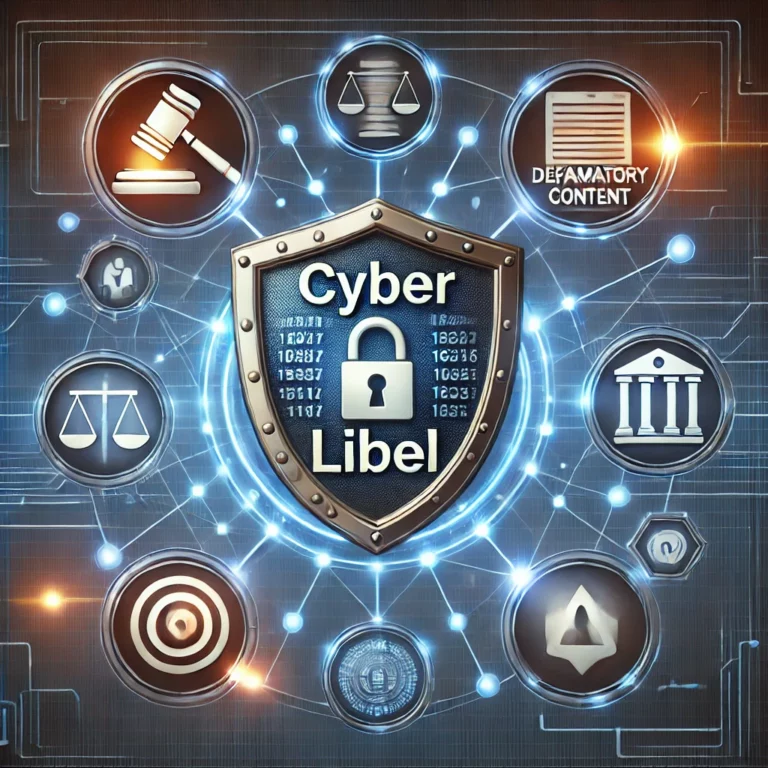Cyber Libel in the Philippines
Elements and Protection Strategies

The digital revolution has changed the way people share and consume information, but it has also expanded the breadth and reach of defamatory acts. In the country, cyber libel laws aim to balance the fundamental constitutional rights to free expression and free speech with the need to protect individuals from cybercrimes and online defamation. This article explores the elements of cyber libel and how individuals can safeguard themselves from cybercrime.
Elements of Cyber Libel
Libel is defined under Article 353 of the Revised Penal Code (RPC) as a public and malicious imputation of a crime, vice, or defect that tends to dishonor, discredit, or bring contempt to a person. When such acts occur online, they fall under cyber libel, as outlined in Section 4(c)(4) of the Cybercrime Prevention Act of 2012 (Republic Act No. 10175).
To establish a case of cyber libel, the following elements must be proven:
1. Defamatory Imputation – A statement must impute a crime, vice, or defect that harms a person’s reputation.
2. Malice – Malice is essential under Article 354 of the RPC
3.Publication – Under Article 354, the defamatory content must be publicly disseminated, reaching at least one third party.
4.Identifiability – The statement must clearly refer to an identifiable individual.
5. Written or Digital Means – Libel is committed through writings or other similar means, including digital platforms, as specified in Article 355 of the RPC and Section 4(c)(4) of the Cybercrime Law.
Clarifying the Scope of Cyber Libel
The Supreme Court, in the Disini v. Secretary of Justice case, highlighted the challenges of applying traditional libel parameters to cyberspace. The Court emphasized that cyberspace operates under unique circumstances and nuances, warning that rigid application of old libel laws could create a “chilling effect” on online communication.
Specifically, the Court struck down Section 5 of the Cybercrime Law, which criminalized “aiding or abetting” cyber libel, declaring it unconstitutional. Petitioners questioned whether actions like “liking,” “commenting,” or “sharing” potentially defamatory posts could be considered as “aiding or abetting.” The Court ruled in the negative, asserting that these actions alone do not constitute criminal liability.
This decision reinforces the importance of defining and delimiting cyber libel laws to ensure they do not suppress legitimate expressions of free speech while addressing defamatory acts.
While the Philippine Constitution guarantees freedom of speech and expressions, these rights are not absolute. Jurisprudence clarified that libel—including cyber libel—is not constitutionally protected speech. The government has a duty to protect individuals from defamation while ensuring that such laws do not infringe on constitutionally guaranteed freedoms.
Protection Strategies against Cyber Libel
With the stricter penalties for cyber libel, it is essential to navigate online platforms responsibly. Here are some tips and strategies to protect against cyber libel:
1. Verify Before Posting – Fact-check information before sharing or posting it online, especially if it could harm someone’s reputation.
2. Avoid Malicious Statements – Steer clear of statements that may be construed as intentionally harmful or defamatory.
3. Exercise Discretion – Although “liking,” “commenting,” or “sharing” posts may not constitute cyber libel per the Disini ruling, these actions can still amplify harmful content.
4. Maintain Privacy Settings – Be cautious about what you make public on your social media platforms to minimize risks.
5. Seek Legal Advice – If you are accused of cyber libel or believe you have been defamed online, consult a lawyer or legal firm to understand your rights and options.
Conclusion
The rapid growth of digital platforms has highlighted the need for laws like the Cybercrime Prevention Act to address defamation in cyberspace. However, as the Disini case illustrates, applying traditional libel frameworks without consideration for the unique nature of online interactions can infringe on free expression. By understanding the elements of cyber libel and practicing responsible online behavior, individuals can navigate the digital landscape more safely while respecting others’ reputations.
How Ricasio Law can assist you?
Ricasio Law is a full-service law firm in the Philippines. Its team of law professionals can give you legal advice, legal representation, and guidance that can help you figure out the best thing to do. Get in touch with us right away to talk about your legal needs and how we can assist you.
Disclaimer: The content on this website is offered as general information only and is not intended to be legal advice or a solicitation for legal services. The information is not being supplied as part of an attorney-client relationship between the Lawyers of Ricasio Law and anyone viewing it. Viewers should not rely on the information on this website for making legal decisions, but should instead get legal assistance from a skilled attorney. You should not act exclusively on the basis of the material on this website and are strongly recommended to seek the legal advice of a lawyer.
If you are interested in the legal representation, counseling, and other legal services that we offer, please contact us using the information provided on this website. You can also discover more about our real estate transaction services here.
Contact Us
+63 (906) 590 0259
Unit 202, Cristina Condominium, Legaspi Street cor. V.A. Rufino Street, Legaspi Village, Makati City
OFFICE HOURS
MON-FRI 9:00 AM – 12:00 PM | 1:00 PM – 5:00 PM (GMT +8)
SAT 10:00 AM – 2:00 PM (GMT +8) by appointment